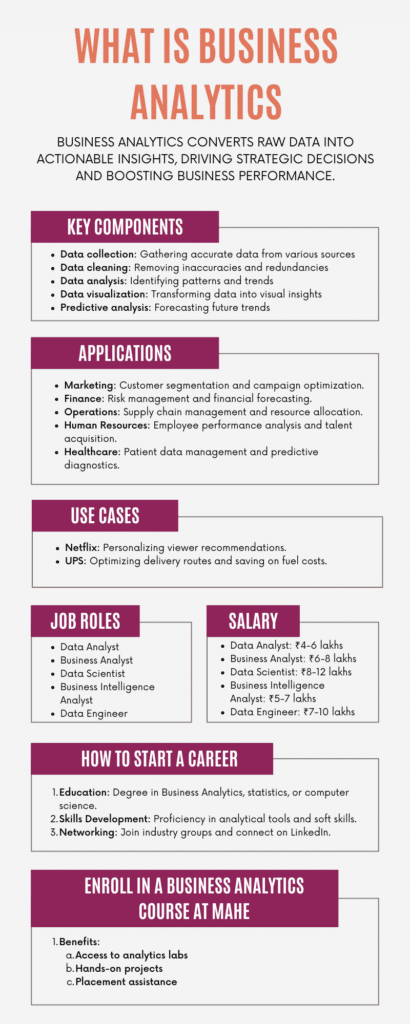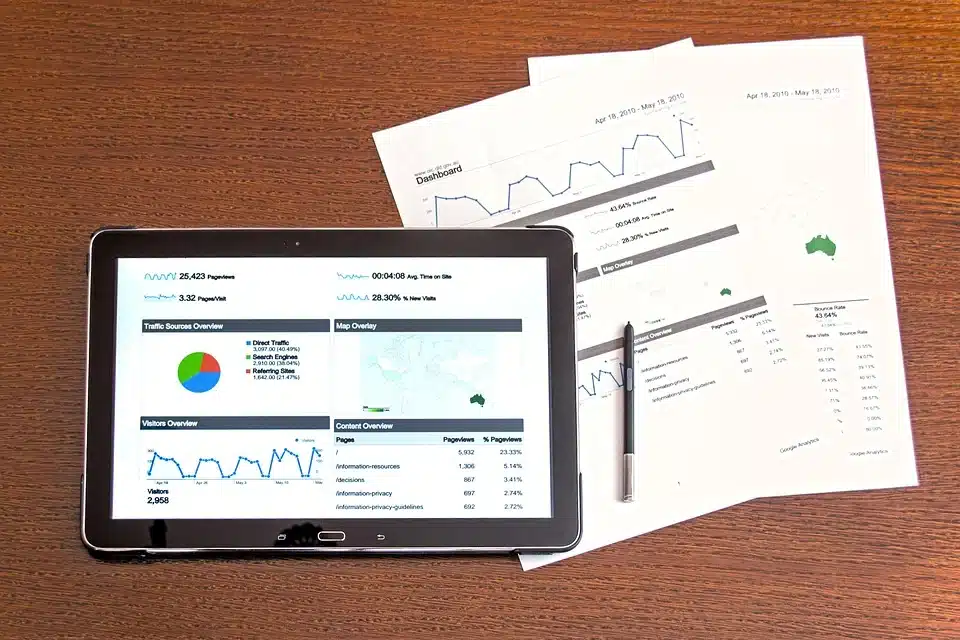Listen to this blog
In the current era, data is often hailed as the new oil. However, just like crude oil, raw data must be refined and processed to extract its true value. Enter business analytics – a powerful tool that converts data into actionable insights, driving strategic decisions and boosting overall business performance.
Key components of business analytics
Followings are the the key components of business analytics that include data collection, data cleaning, data analysis, data visualization, and predictive analysis.
- Data Collection: The foundation of business analytics starts with gathering accurate and relevant data from various sources like databases, spreadsheets, and real-time streaming data.
- Data Cleaning: Before diving into analysis, data must be cleaned to remove inaccuracies, inconsistencies, and redundancies.
- Data Analysis: Techniques like descriptive, diagnostic, and predictive analytics help in deciphering patterns and trends.
- Data Visualization: Tools like Power BI and Tableau transform data into visual representations, making it easier to grasp complex insights at a glance.
- Predictive Analytics: Using historical data and machine learning algorithms to forecast future trends.

You may be interested to know more about the difference between business analytics & data analytics.
Applications of business analytics
Various applications of business analytics can be seen across domains. We have listed some of them below –
- Marketing: Enhancing customer segmentation, targeting, and optimizing marketing campaigns.
- Finance: Managing risks, detecting fraud, and improving financial forecasting.
- Operations: Streamlining supply chain management, improving process efficiencies, and optimizing resource allocation.
- Human Resources: Employee performance analysis, talent acquisition strategies, and workforce optimization.
- Healthcare: Patient data management, predictive diagnostics, and improving treatment outcomes.
Use cases and case studies
Real-world examples bring theory to life. Let’s talk about Netflix, the streaming giant uses business analytics to personalize recommendations for each viewer to drive higher engagement and satisfaction. Another example is UPS, which employs predictive analytics to optimize delivery routes, saving millions in fuel costs. Listed below a few other use cases –
- Amazon: Amazon uses business analytics to optimize its supply chain, improve product recommendations, and detect fraud.
- Walmart: Walmart uses business analytics to improve inventory management, optimize pricing, and personalize customer experiences.
- Uber: Uber uses business analytics to optimize its pricing algorithms, manage its fleet of drivers, and improve customer satisfaction.
The future of business analytics
The landscape of business analytics is rapidly evolving, driven by technological advancements and changing business needs. According to Market Research Future, the business analytics market is anticipated to expand from USD 46.33 billion in 2024 to USD 90.67 billion by 2032, reflecting a compound annual growth rate (CAGR) of 8.50%. In 2023, the market size was valued at USD 43.25 billion.
Here are some of the latest trends shaping the future of business analytics:
- Generative AI
- Cloud Computing
- Data Sharing and Monetization
- Data Mesh
- Data Governance and Security
- Automation and Citizen Data Scientists
- Real-time Analytics
- Decision Intelligence
- Augmented Analytics
- Ethical Considerations
These trends highlight the dynamic nature of business analytics and its potential to transform industries. By staying ahead of these trends, businesses can harness the power of data to drive growth and innovation.
How to start a career in Business Analytics
By earning foundations in maths and stats to pursuing a degree course, you can take the following steps to start a career in business analytics.
- Get a solid foundation in mathematics and statistics: This will be essential for understanding and applying data analysis techniques.
- Learn programming languages: Python and R are popular choices for data analysis and machine learning.
- Gain practical experience: Look for opportunities to gain hands-on experience with data analysis projects, either through internships, freelance work, or personal projects.
- Network with professionals in the field: Attend industry events, connect with professionals on LinkedIn, and join online communities.
- Consider pursuing a degree or certification in business analytics: An MBA in Business Analytics or a specialized data science program can provide you with the necessary skills and knowledge.
You may like to know the reasons to become a business analyst.
Job roles in business analytics
The field of business analytics offers a wide range of career opportunities, catering to various skill sets and interests. Some of the most common job roles include:
- Data Analyst: Focuses on interpreting data and providing actionable insights.
- Business Analyst: Bridges the gap between IT and business to improve processes and decision-making.
- Data Scientist: Applies advanced statistical techniques and machine learning to solve complex problems.
- Business Intelligence Analyst: Specializes in using tools to visualize data and create informative reports.
- Data Engineer: Designs and maintains data pipelines to ensure data flows seamlessly from sources to analysis platforms.
Check out more on business analytics job roles.
Expected salary
The salary for business analytics professionals varies depending on factors such as experience, location, and industry. However, the demand for skilled business analysts is high, and salaries are generally competitive.
| Job role | Average annual salary in India (INR) |
|---|---|
| Data Analyst | 6.5 – 12 lakhs |
| Business Analyst | 8 – 15 lakhs |
| Data Scientist | 10 – 25 lakhs |
| Business Intelligence Analyst | 7 – 12 lakhs |
| Data Engineer | 8 – 15 lakhs |
Check out the FAQs on a career in business analytics.
Enroll in MAHE’s MBA in Business Analytics Program
For a comprehensive education in business analytics, consider enrolling in the online MSc in Business Analytics program at the Manipal Academy of Higher Education (MAHE). This program offers a blend of theoretical knowledge and practical experience, taught by industry experts. Key benefits include:
- Access to state-of-the-art analytics labs
- Hands-on projects with industry partners
- Placement assistance and career guidance
In conclusion, business analytics is a dynamic field with vast applications and lucrative career opportunities. By equipping yourself with the right skills and education, you can be at the forefront of this data-driven revolution.
Remember, data is only as powerful as the insights you can derive from it. So, start your journey in business analytics today and transform the way businesses operate.
Become future-ready with our online M.Sc. in Business Analytics program









